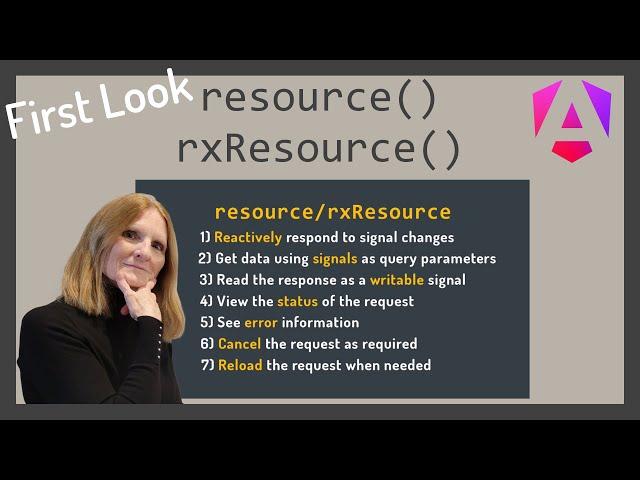
First Look at Angular's new resource() and rxResource()
Angular signals haven't had great support for asynchronous operations, until now! Angular v19, coming out next month, introduces a new experimental API called resource(). And an rxjs-interop API called rxResource(). These features revolutionize how we handle our HTTP requests!
In this video, we take a first look at both resource() and rxResource() and how you can leverage them in your projects.
*Links*
Code: https://stackblitz.com/~/edit/resource-first-look-deborahk
Code with extra features: https://stackblitz.com/~/edit/resource-first-look-extended-deborahk
YouTube video: "Angular Signals: What? Why? and How?": https://youtu.be/oqYQG7QMdzw
YouTube video: "Using toSignal and toObservable for RxJS interop": https://youtu.be/xQIOWkBe5wQ
Article: "Everything you need to know about the resource API": https://push-based.io/article/everything-you-need-to-know-about-the-resource-api
Article: "Asynchronous Data Flow with Angular’s new Resource API": https://www.angulararchitects.io/en/blog/asynchronous-resources-with-angulars-new-resource-api/
PR for resource: https://github.com/angular/angular/pull/58255
resource() source code: https://github.com/angular/angular/blob/0f2f7ec754a26c089c81cfdbb0ddc1fa8a269e16/packages/core/src/resource/resource.ts
rxResource source code: https://github.com/angular/angular/blob/0f2f7ec754a26c089c81cfdbb0ddc1fa8a269e16/packages/core/rxjs-interop/src/rx_resource.ts
*Content*
00:00 New features: resource() and rxResource()
00:35 resource()
01:41 rxResource()
03:25 Value Signal
04:56 Query Parameter
06:46 Multiple Query Parameters
08:26 resource() vs toSignal()
09:00 Updating the Data
10:38 Benefits of resource() and rxResource()
11:25 Wrap up
▬▬▬▬▬▬▬▬▬▬▬▬▬▬▬▬▬▬▬▬▬
😊About Me
Hey! I'm Deborah Kurata
I'm a software developer and YouTube content creator. I speak at conferences such as VSLive and ng-conf. I write articles for freeCodeCamp. And I'm a Pluralsight author with courses in the top 10 most popular (out of 7,000+) for over 5 years. For my work in support of software developers, I've been recognized with the Microsoft Most Valuable Professional (MVP) award, and I'm a Google Developer Expert (GDE).
View my YouTube content: https://www.youtube.com/@deborah_kurata
Contact me on Twitter: https://twitter.com/DeborahKurata
Find my Pluralsight courses: https://www.pluralsight.com/profile/author/deborah-kurata
Access my freeCodeCamp articles: https://www.freecodecamp.org/news/author/deborah-kurata/
▬▬▬▬▬▬▬▬▬▬▬▬▬▬▬▬▬▬▬▬▬
#angular
#angularsignals
#angularstatemanagementwithsignals
#angularstatemanagement
#angulartutorials
#angularforbeginners
#angularbestpractices
#resource
#rxresource
#angularv19
In this video, we take a first look at both resource() and rxResource() and how you can leverage them in your projects.
*Links*
Code: https://stackblitz.com/~/edit/resource-first-look-deborahk
Code with extra features: https://stackblitz.com/~/edit/resource-first-look-extended-deborahk
YouTube video: "Angular Signals: What? Why? and How?": https://youtu.be/oqYQG7QMdzw
YouTube video: "Using toSignal and toObservable for RxJS interop": https://youtu.be/xQIOWkBe5wQ
Article: "Everything you need to know about the resource API": https://push-based.io/article/everything-you-need-to-know-about-the-resource-api
Article: "Asynchronous Data Flow with Angular’s new Resource API": https://www.angulararchitects.io/en/blog/asynchronous-resources-with-angulars-new-resource-api/
PR for resource: https://github.com/angular/angular/pull/58255
resource() source code: https://github.com/angular/angular/blob/0f2f7ec754a26c089c81cfdbb0ddc1fa8a269e16/packages/core/src/resource/resource.ts
rxResource source code: https://github.com/angular/angular/blob/0f2f7ec754a26c089c81cfdbb0ddc1fa8a269e16/packages/core/rxjs-interop/src/rx_resource.ts
*Content*
00:00 New features: resource() and rxResource()
00:35 resource()
01:41 rxResource()
03:25 Value Signal
04:56 Query Parameter
06:46 Multiple Query Parameters
08:26 resource() vs toSignal()
09:00 Updating the Data
10:38 Benefits of resource() and rxResource()
11:25 Wrap up
▬▬▬▬▬▬▬▬▬▬▬▬▬▬▬▬▬▬▬▬▬
😊About Me
Hey! I'm Deborah Kurata
I'm a software developer and YouTube content creator. I speak at conferences such as VSLive and ng-conf. I write articles for freeCodeCamp. And I'm a Pluralsight author with courses in the top 10 most popular (out of 7,000+) for over 5 years. For my work in support of software developers, I've been recognized with the Microsoft Most Valuable Professional (MVP) award, and I'm a Google Developer Expert (GDE).
View my YouTube content: https://www.youtube.com/@deborah_kurata
Contact me on Twitter: https://twitter.com/DeborahKurata
Find my Pluralsight courses: https://www.pluralsight.com/profile/author/deborah-kurata
Access my freeCodeCamp articles: https://www.freecodecamp.org/news/author/deborah-kurata/
▬▬▬▬▬▬▬▬▬▬▬▬▬▬▬▬▬▬▬▬▬
#angular
#angularsignals
#angularstatemanagementwithsignals
#angularstatemanagement
#angulartutorials
#angularforbeginners
#angularbestpractices
#resource
#rxresource
#angularv19
Тэги:
#angular #angular_signals #angular_state_management_with_signals #angular_state_management #angular_tutorials #angular_for_beginners #angular_best_practices #resource #rxresource #angular_v19Комментарии:
First Look at Angular's new resource() and rxResource()
Deborah Kurata
I Let My Viewers Try to Hack Me
Basically Homeless
Marvel Legends LUKE CAGE & IRON FIST 2pk Action Figure Review
AnthonysCustoms
Sailor man - Sprunki animation
Ceezerres
MUSLERA'NIN 1 GÜNÜ
EgemizaJ
【4弦】怪獣の花唄/Vaundy/ベースTAB/Bass cover
SHOJI Bass
மதக் கலவரத்தைத் தூண்டிய ஆட்டுக்கு 35 வருட ஆயுள் தண்டனை? Telugu Movies in Mr Tamilan Voice Over
Mr Tamilan Indian Movies


























